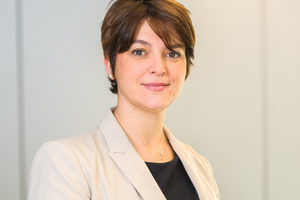Views from ...
Development and deployment of SMRs in the EU
 Berta Picamal, DG Office, Legal & Intl Relations Director
Berta Picamal, DG Office, Legal & Intl Relations Director
Since late October 2019, the development and deployment of Small Modular Reactor (SMRs) in the EU has been at the core of many discussions. Indeed, since the US-EU High-level industrial forum on Small Modular Reactors things have accelerated, even if FORATOM’s 2050 vision published in late 2018 already took into account the need for SMR development under a high nuclear scenario, considering them as an ideal partner to complement large scale reactors.
From the one side, FORATOM has established an SMR Task Force, the objective of which is to develop European Nuclear industries’ position on the required technical and technology developments, including readiness for implementation and research & innovation progress in the field. Likewise, exploring and analysing the licencing and regulatory aspects is crucial in order to enable a timely deployment of SMR technology. Economic and political conditions to support the development of SMR for applications in Europe are also at the core of the discussions as well as market integration for specific SMR deployment in powering industrial installations, district heating plans, hydrogen production, etc.
From the other side, a workshop organised in late June 2021 by the European Commission (EC) triggered the start of a discussion to launch a European SMR partnership. FORATOM, in collaboration with SNETP (Sustainable Nuclear Energy Technology Platform) is working in close cooperation with the EC on the establishment of this. The partnership’s objectives are to:
- Progress towards the deployment of SMRs within Europe by the early 2030s (investment, market conditions, skills, manufacturing, business case…)
- Ensure supportive market aspects to enable the inclusion of SMRs in hybrid energy systems / high RES power systems: flexibility, ancillary services to power systems…
- Develop a collaborative environment for the SMR value chain within Europe
- Establish the conditions and partnerships for SMRs to deliver low carbon electricity and heat for multiple applications
- Position the European SMR value chain internationally and seize opportunities for the export of the European value chain
- Develop industry standards and SMR deployment conditions in line with European SMR deployment scenarios
- Leverage European R&I for deployment of SMRs
- Support efforts towards licencing and regulatory of SMRs within Europe.
All of these encompass the work being undertaken within the FORATOM Task Force and will also be managed via different workstreams coordinated by a Steering Committee.
Never before have discussions on SMRs been so in line with the challenges the EU is facing when combating climate change but also, given today’s context, ensuring security of supply, energy independence and the competitiveness of the whole European industry that has to rely on affordable energy 24/7. SMRs, combined with large-scale nuclear reactor new build projects, as well as ensuring long term operation of the existing fleet, are crucial, if not indispensable, to achieve this.
SMR development and deployment are part of an overall strategy that Member States have now embraced openly, and the proof of this is recent announcements by Romania and France – but not only, as several EU countries have included them in their NECPs (National Energy and Climate Plans).
The time has come to make things happen and no delays are allowed!
